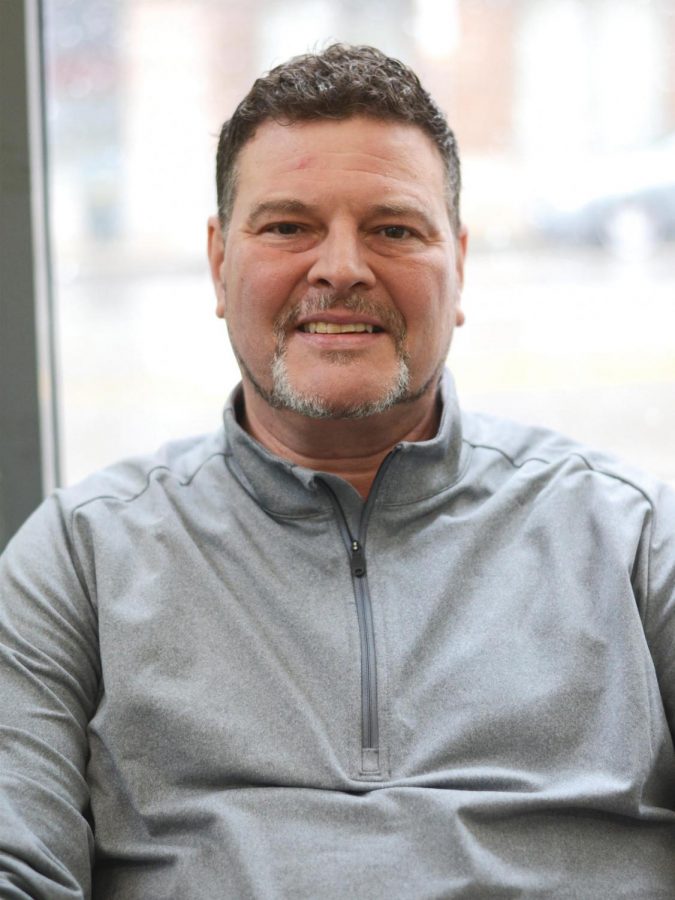From finishing degrees to changing paths
Non-traditional students share why they chose to return
Photo by Kelsee McHugh
52-year-old Thom Verdi returned back to school to pursue a degree in mortuary science after a life of cosmetology
March 27, 2018
After eight years of being away from Point Park, Laura Smith returned to complete the one credit she needed to earn her public relations and advertising degree under the university’s 2006 curriculum.
At 52 years old, Thom Verdi is one month away from completing his funeral services capstone following decades working in the cosmetology industry.
Whatever the reason may be, these non-traditional students uphold the notion that it is never too late to go back to school or follow a different path. As of 2017, non-traditional students account for just over 20% of undergraduates at Point Park, according to the 2017-2018 university factbook.
Smith, 29, originally planned to walk at graduation in May 2010, however she did not complete the required 70 hours of practicum to receive credit, resulting in an incomplete degree.
“I should’ve went back to school that fall, but at that time I already had a full-time job working at iHeartMedia,” Smith said. “I was so mad that I didn’t finish at the time, so I never went back.”
Despite not finishing, Smith spent the next eight years with steady nine-to-five jobs, starting out with event planning for nonprofits and later moving into the liquor industry, where she now is in her second year as a sales brand ambassador for Fireball Whiskey.
Yet working full-time is what prevented her from finishing her degree.
“It was a struggle,” Smith said. “I actually tried to come back to school about two years ago, but I couldn’t. It was a lot of running around down here, meeting with different individuals to try and get them to let me come back down here and make a comeback on my 2006 program guide.”
Smith said that finding the right person to talk to about picking up where she left off was the biggest challenge she faced.
“Students can usually come back within 10 years, when it’s easy to make things mesh, whereas someone here in the early 90s would have to come back new,” University Registrar Scott Spencer said.
Now that Smith works independently with Fireball Whiskey, the job allows a more flexible schedule and the freedom to complete practicum, which is now nearing completion.
In early March, Smith assisted Professor Aimee-Marie Dorsten with the regional Society of Professional Journalists conference held on campus.
“I’m blessed to finally have the opportunity I have now to go back to school and finish this one credit that I need to finish my Bachelor’s degree,” Smith said.
Despite receiving her degree, she plans to either stay within the liquor industry or move into event planning upon graduation.
“Honestly I never even wanted to do ad or [public relations],” Smith said. “Event planning is my experience, that’s what I’ve done for the last eight years…before I moved into the liquor industry. It’s just something I’m doing for myself essentially right now.”
Verdi, however, returned to school to steer his career in a completely different direction. Fresh out of high school, he moved from his hometown of Ashtabula, Ohio to Columbus to attend beauty school.
“I’d always done the neighborhood people’s hair, and my sister’s a hairdresser, so I kind of followed in her footsteps there because I watched her and learned and gave the neighbor ladies perms and color and all that stuff,” Verdi said.
He went on to establish himself in the cosmetology industry, eventually working for L’Oreal as the director of education in their Matrix hair care division.
Verdi saw a stable future within the company at the time, but had to step down and move to New York City when his mother fell ill in 2007.
“I came off the road and I ended up going back into a salon and started selling jewelry… then became manager [of the jewelry store,]” Verdi said. “Then the economy kind of went to crap, and I got laid off.”
Verdi then decided to pursue mortuary school after the lay-off in 2012. At 47 years old, he began attending Pittsburgh Institute of Mortuary Sciences (PIMS) on a 20-month program to receive an Associate’s degree in specialized business.
“It all started out when I was 13 years old,” Verdi said. “My father had passed away and I had met the funeral director who took care of my family, and he kind of took me under his wing and got me interested. It’s kind of one of those things that just stayed in the back of my mind.”
After receiving his license to be a funeral director in 2015 and practicing for two and a half years, Verdi came across Point Park’s funeral services capstone program—the only one of its kind in the area that would accept his 97 credits from PIMS.
“I kept deciding that this is what I want to do,” Verdi said. “I can come back and complete my Bachelor’s…and I was able to do it in two semesters.”
According to Spencer, transfer students can bring in up to 60 credits from community colleges, 70-80 credits from another four-year institution, and must complete at least 30 credits through Point Park to graduate.
“We usually don’t take preparatory schools, technical schools, institutions not accredited at all,” Spencer said. “We also want to make sure the student is getting a good education at the same time.”
Verdi described his time at Point Park as a “great experience,” crediting its diversity for his ability to fit in well with his younger peers.
He hopes to move back to Columbus after earning his Bachelor’s, where he already found potential– and promising– employment at two funeral homes. Both jobs offer the position of funeral director, allowing him to apply his knowledge of the embalming process, partially thanks to beauty school, and the operation of the funeral home as a business, thanks to the decision to be a student again.
“The timing was right, so why not?” Verdi said.



















